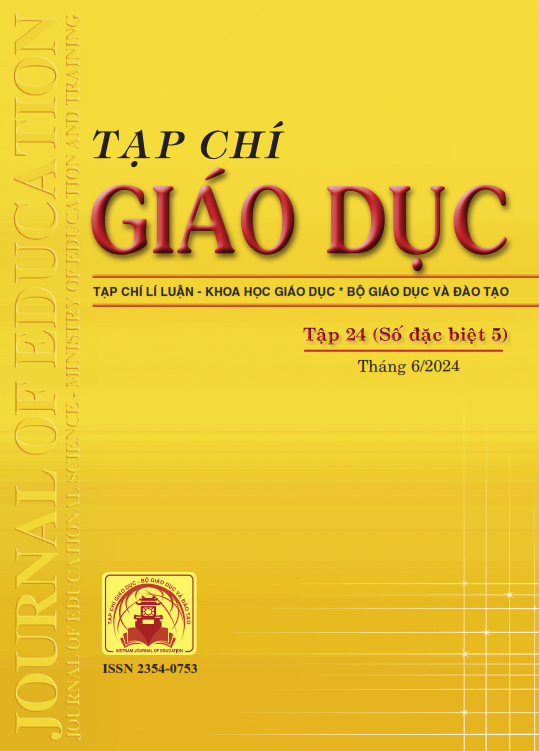Quy trình thiết kế hoạt động dạy học sử dụng đánh giá quá trình nhằm phát triển năng lực giải quyết vấn đề toán học cho học sinh phổ thông
Tóm tắt
To improve the effectiveness of Math teaching, it is necessary to design and maintain interactive activities between teachers and students and between students and students to create opportunities for students to gain knowledge and solve mathematical problems.. In particular, the difficulties students encounter in the process of solving mathematical problems should be identified so that teachers can provide timely support. Among forms of assessment, formative assessment plays an important role, because formative assessment is closely related to teaching and learning activities. This study proposes a process for designing teaching activities using formative assessment to develop students' mathematical problem-solving competence. Using formative assessment in teaching helps teachers and students recognize and overcome difficulties and problems, and get solutions to adjust teaching and learning activities to be more effective.
Tài liệu tham khảo
Andersson, C., & Palm, T. (2017). The impact of formative assessment on student achievement: A study of the effects of changes to classroom practice after a comprehensive professional development programme. Learning and Instruction, 49, 92-102. https://doi.org/10.1016/j.learninstruc.2016.12.006
Angelo, T. A., & Cross, K. P. (1994). Classroom Assessment Techniques: A Handbook for College Teachers (Vol. 2nd). San Francisco: Jossey-Bass.
Bennett, R. E. (2011). Formative assessment: A critical review. Assessment in Education: Principles, Policy and Practice, 18(1), 5-25. https://doi.org/10.1080/0969594X.2010.513678
Black, P., & Wiliam, D. (2009). Developing the theory of formative assessment. Educational Assessment, Evaluation and Accountability, 21(1), 5-31. https://doi.org/10.1007/s11092-008-9068-5
Black, P., & Wiliam, D. (2010). Inside the Black Box: Raising Standards Through Classroom Assessment. Phi Delta Kappan, 92(1), 81-90. https://doi.org/https://doi.org/10.1177/003172171009200119
Bộ GD-ĐT (2018). Chương trình giáo dục phổ thông môn Toán (ban hành kèm theo Thông tư số 32/2018/TT-BGDĐT ngày 26/12/2018 của Bộ trưởng Bộ GD-ĐT).
Brookhart, S. M. (2011). Educational Assessment Knowledge and Skills for Teachers. Educational Measurement Issues and Practice, 30(1), 3-12.
Cai, J., & Hwang, S. (2020). Learning to teach through mathematical problem posing: Theoretical considerations, methodology, and directions for future research. International Journal of Educational Research, 102. https://doi.org/ 10.1016/j.ijer.2019.01.001
Clark, I. (2012). Formative Assessment: Assessment Is for Self-regulated Learning. Educational Psychology Review, 24(2), 205-249. https://doi.org/10.1007/s10648-011-9191-6
Haris, I., Pulukadang, W. T., Husain, R., Ilham, A., & Abdullah, G. (2021). Improving the Quality of Competency-Based Assessment through a Classroom Training Activity 1. MEXTESOL Journal, 45(2). http://www.mextesol. penamiller.com/static/index-2.html
Hattie, J., & Timperley, H. (2007). The power of feedback. Review of Educational Research, 77(1), 81-112. https://doi.org/10.3102/003465430298487
Keeley, P., & Tobey, C. R. (2011). Mathematics Formative Assessment: 75 Practical Strategies for linking Assessment, Instruction, and Learning. Corwin, A SAGE Publications Company.
Nguyễn Bá Kim, Vũ Dương Thụy (2003). Phương pháp dạy học môn Toán. NXB Giáo dục.
Niss, M., & Højgaard, T. (2019). Mathematical competencies revisited. Educational Studies in Mathematics, 102(1), 9-28. https://doi.org/10.1007/s10649-019-09903-9
Schoenfeld, A. (1985). Mathematical Problem Solving. Academic Press.
Stiggins, R., & Chappuis, J. (2006). Assessment FOR learning rather than assessment OF learning helps students succeed. Journal of Staff Development, 27(1), 10-14.
Wiliam, D. (2011). Embedded Formative Assessment. Solution Tree Press.
Wiliam, D., & Thompson, M. (2007). Integrating assessment with learning: what will it take to make it work? C. A. Dwyer (Ed.), 53-82. https://doi.org/https://doi.org/10.4324/9781315086545-3
Đã Xuất bản
Cách trích dẫn
Số
Chuyên mục
Giấy phép

Tác phẩm này được cấp phép theo Ghi nhận tác giả của Creative Commons Giấy phép quốc tế 4.0 .












